Teak for yachts strips exotic forest, boosts harsh regime. It’s shipped here despite U.S. ban
On Dec. 16 last year, the Maersk Sana, a Singapore-registered cargo ship, cruised into the United States and docked at the Port of Miami an hour before dawn. On board was a container carrying 51,000 pounds of Burmese timber bound for wood trader Florida Teak.
The West Palm Beach firm boasts of being the supplier for a company that provides teak used to build decks on Viking boats. Viking is a premier boat manufacturer whose yachts are owned by NBA legend Michael Jordan and celebrity chef Emeril Lagasse.
Teak from Myanmar (formerly called Burma) is coveted by yacht owners and builders for its pliancy and water-resistance, but it has a dark side: The country of 54 million is run by a military junta that has so far killed at least 3,000 and arrested more than 19,000 civilians, according to human rights groups. The nation has descended into civil war.
In April 2021, in the aftermath of a military coup that brought the junta to power, the U.S. Treasury Department imposed sanctions on, among other entities, Myanma Timber Enterprise, the state-owned firm that de facto controls the country’s timber sector.
The measures make it illegal for Americans to do business with sanctioned individuals and entities and prohibit any transaction with them in U.S. dollars to prevent financing odious regimes. Since most global business is done via U.S. currency, the measures restrict the finances of those sanctioned and are aimed at freezing them out of the international banking system.
The December shipment of teak — loaded at a Myanmar port owned by an oligarch with close ties to the military — was Florida Teak’s seventh of Burmese teak last year, bringing the total imported by the company in 2022 to roughly 437,000 pounds, import records analyzed by the Miami Herald show.
The Miami Herald’s reporting is part of a collaborative project with the nonprofit investigative outlet the International Consortium of Investigative Journalists and other partners across the world. The project, titled “Deforestation, Inc.”, explores the challenges of enforcing trade laws and economic sanctions and reducing the demand for coveted items whose production ravage the environment or prop up repressive regimes or criminal organizations — sometimes all of these.
At a time of increasing focus on how the demand for natural resources like diamonds, oil or rainforest-mined gold finances wars, conflict and exploitation, the Herald’s findings on the supply chains of teak — which makes its way into furniture, flooring and the glamorous teak-decked yachts on display at conventions like the Miami International Boat Show — shed light on a product with a history of corruption and labor abuses and how consumers in Florida and beyond may be unwittingly financing a military junta’s reign of terror against its own people.
At February’s Miami Boat Show, yacht brokers either denied using Burmese teak or said they didn’t know where the teak came from.
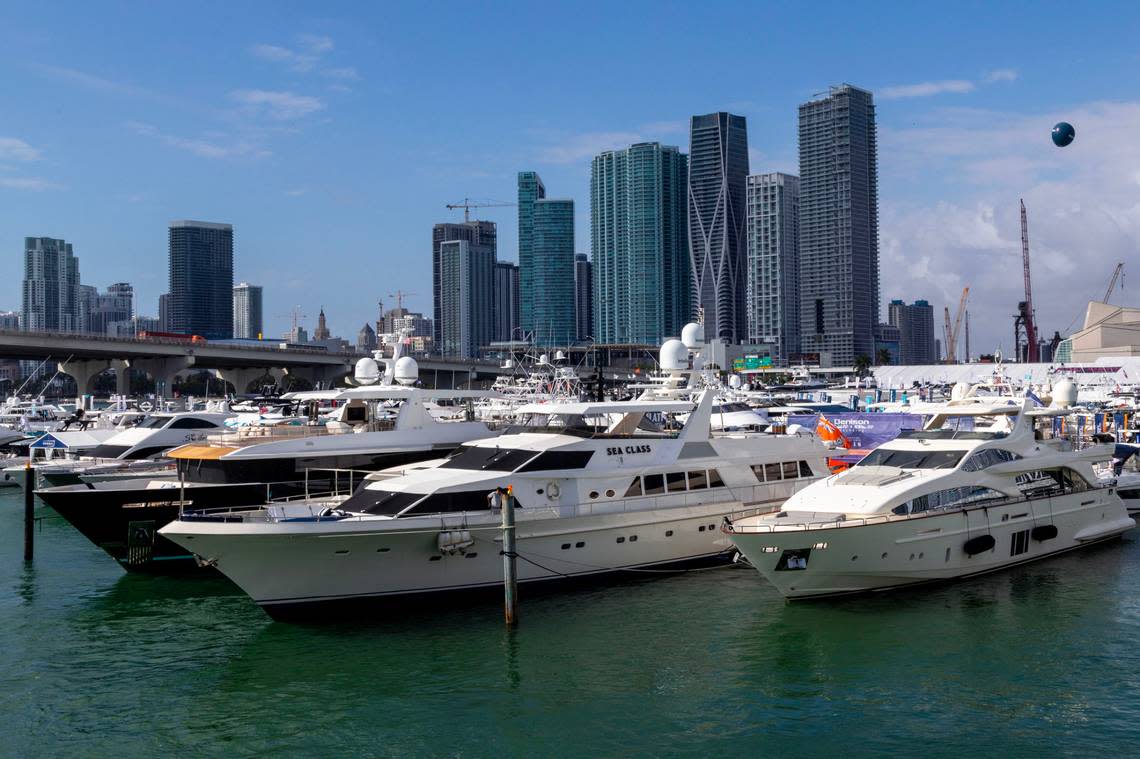
Teak was first commercially logged by Europeans in Myanmar in the 1800s. Its durability and resistance to water and pests make it ideal for boat-decks and furniture. Its high cost is due to a combination of huge demand and shrinking stocks, coupled with a laborious extraction process. It is logged deep in the jungles, processed in sawmills and finally exported. While the tree is native to most of Southeast Asia and parts of India, authentic Burmese teak is considered to be the highest-grade. With its regal tawny-golden hue and brown streaks that lighten as it dries and ages, the wood is seen as a symbol of affluence and has a prestige value that makes it coveted by the rich and famous when purchasing luxury yachts.
Florida Teak says that its practices are legal.
“We are committed to legality and always have been, beyond required documentation even before current requirements, including on our imports from Burma,” said Florida Teak proprietor Peter Kajanoja. He said they employ third-party companies to verify their supply chains are clean.
“The requirements for import with these verifications are very complex and thorough,” he said but declined to comment further and did not respond to detailed questions sent by the Herald. Neither did he show a copy of any verification report.
The firm Florida Teak supplies, Teak Deck Company, which in turn supplies wood for Viking Yachts, did not respond to requests for comment from the Herald.Florida Teak is not the only U.S. business that imported teak from Myanmar after the sanctions were imposed.
Nearly six million pounds of timber from Myanmar entered the U.S. post-sanctions, the Herald’s analysis found, with around 350,000 pounds entering through Port of Miami or Fort Lauderdale’s Port Everglades. The total value of wood-products that have entered directly from Myanmar post-sanctions currently stands at $25 million.
Yearly figures indicate that sanctions have hardly made a dent in timber imports from Myanmar: Around 3.7 million pounds of Burmese timber entered the United States in 2022, roughly the same as the preceding two years, the Herald found. In terms of their worth, American firms imported Burmese wood-products worth $14.7 million in 2022, the same as 2021 but more than in 2020, when no sanctions were in place.
The figures exclude shipments that may have entered via third countries and only account for those that were loaded in Myanmar post-sanctions and were then directly shipped to the United States.
“There is at least reason to believe that there’s a violation of the sanctions — that seems clear,” said Michael Malloy, an ex-Treasury Department sanctions expert who currently teaches law at the University of the Pacific in Sacramento. He said the facts and circumstances surrounding these shipments definitely need further investigation.
Multiple other former Treasury sanctions experts with whom the Herald shared its findings concurred.
Myanmar made at least $400 million in timber exports since the coup, roughly a fifth of which came from sanctioned markets of the United States and the European Union, international trade data analyzed by the Herald shows.
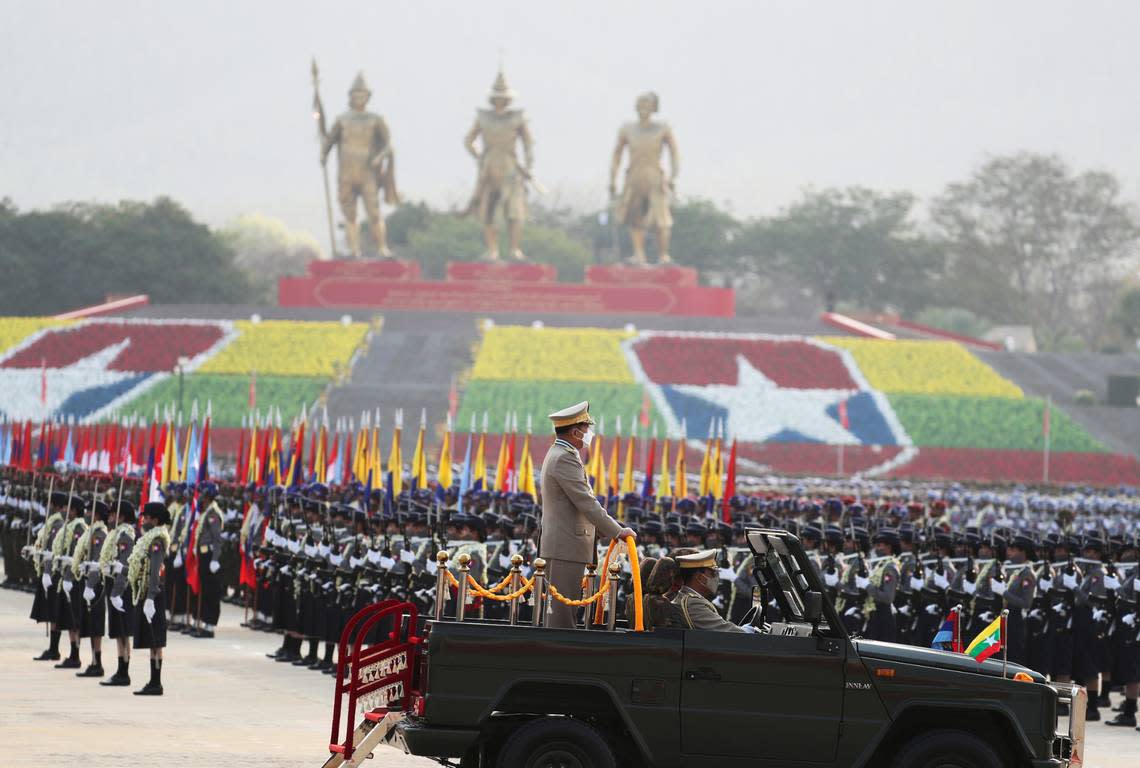
Yadanar Maung of the pro-democracy activist coalition, Justice for Myanmar, said the junta is using this revenue to purchase “arms, equipment and fuel needed to wage its campaign of terror against the people.”
Myanmar’s laws recognize only wood from the Myanma Timber Enterprise, the sanctioned state firm, as legitimate. Legal experts said that if U.S. companies import Myanmar teak from any other source, they risk prosecution under the Lacey Act, which makes it illegal to do business in fish, wildlife or plant-products if they violate laws in the originating country.
“If Myanmar says you can’t export teak unless that wood is from a certain organization or is exported from a certain port, then not doing one or not doing both appears to violate the Lacey Act,” said Kristina Alexander, former legislative attorney with the U.S. Congressional Research Service specializing in environmental laws.
For violating Treasury’s sanctions, civil and criminal penalties can exceed several million dollars and bring up to 20 years of prison time. Another risk of ignoring sanctions is that the violator’s properties and assets might be frozen if Treasury deems it to be related to a prohibited transaction with Myanmar.
Separately, penalties for Lacey Act violations range from $10,000 per charge to $500,000 and five years in prison.
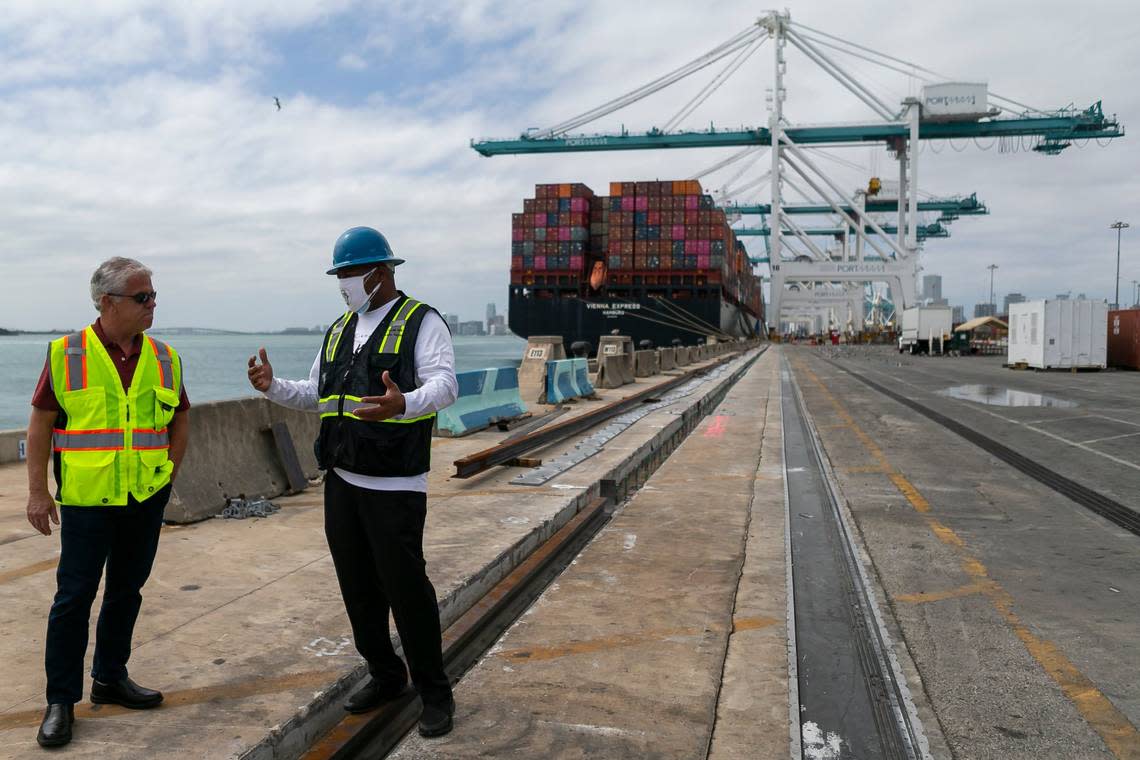
In some cases, if a product originating from a sanctioned entity is bought and sold by several intermediaries before reaching its final destination — in this instance, Florida Teak — the final purchase, in legal terms, could circumvent punishment.
But Malloy said it doesn’t matter if the traders are buying teak from intermediaries because the goods are still originating in Myanmar from MTE and the rules clearly prohibit any transaction that even seeks to “evade or avoid” the sanctions, meaning using intermediaries might itself be a violation if it is done to directly or indirectly circumvent the prohibition.
U.S. agencies played a game of hot potato when asked by the Herald about these imports.
Customs and Border Patrol did not respond to the Herald’s questions. Its parent agency, the Department of Homeland Security, referred the Herald to the Treasury Department, which in turn referred the journalist to the State Department.
A State Department spokesperson said the agency “rigorously investigates potential sanctions violations” but declined to comment further. The Justice and Agriculture departments declined to comment besides saying that they are “aware” of the issue. None of the agencies confirmed if any action is being taken against the teak importers.
“Why this [Myanmar sanctions] is not being enforced is a question of priority,” said Peter Piatetsky, another former Treasury sanctions expert who now runs a company that provides software to prevent financial crime.
Piatetsky said at the moment all resources seem to be focused on enforcing Russia-related sanctions.
The U.S. government sometimes does issue special exemptions to conduct trade with sanctioned entities, including in 2014, during a time of prior sanctions when the International Wood Products Association successfully lobbied for an exemption for MTE-sourced wood.
Government agencies, the IWPA, and companies bringing in the wood all declined to say if special exemptions had been issued to import MTE-sourced teak after the 2021 sanctions took effect.
The Herald spoke to roughly three dozen experts on this issue, including ex-U.S. ambassadors to Myanmar, former European advisors to the pre-coup civilian government in Myanmar, due diligence experts who had previously worked at the FBI, multiple former sanctions experts with the Treasury Department, ex-Justice Department prosecutors and other legal experts and environmental and civil society advocates. The Herald is withholding the names of some sources who live or work in Myanmar for their safety and security.
The sourcing of Burmese teak has been a cause for concern even before the sanctions. Experts on the region described Myanmar’s forestry sector as resistant to reforms, overrun with corruption and rife with illegal logging.
“Doing business in teak [in Myanmar] means you need to know the right people and pay the right people off,” said Derek Mitchell, former U.S. ambassador to Myanmar.
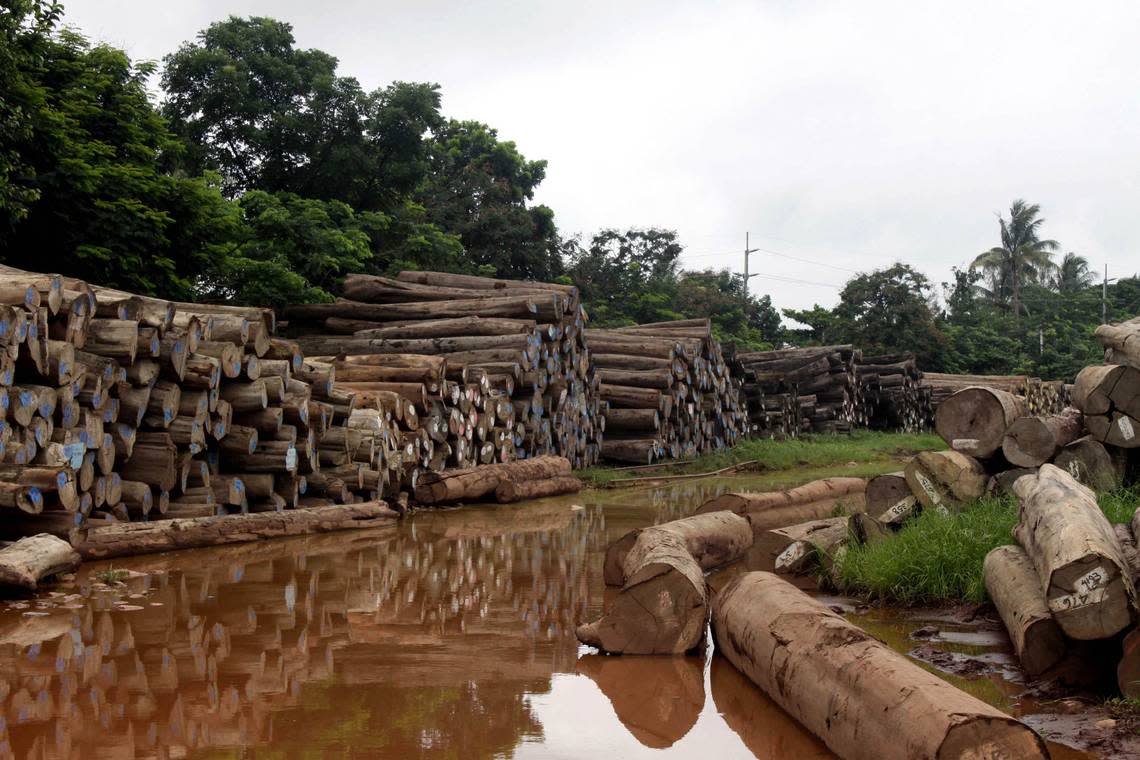
Widespread poverty means that children are sometimes found working in logging camps where drug consumption is often “so severe that it can shorten life expectancy of children involved in the logging sector,” a 2020 study noted. A 2021 U.S. Labor Department report found that child labor, including forcing children under the age of 14 to work, abounds in the forestry sector.
Teak importers already “know of these tricky things” but “rich people don’t care,” said Win Myo Thu, who has worked in Myanmar’s environmental sector for more than three decades. Profit-margins are huge and the only solution, he said, is reduced consumer-demand.
The forest for the trees
Nestled between China, India and Thailand, Myanmar gained independence from Britain in 1948 but came under military dictatorship in 1962. The military controlled all aspects of the economy during this period, until the 1990s, when the country gradually started to open up and oligarchs tied to the regime took charge.
When Myanmar emerged from the dictatorship and enjoyed a decade of semi-democratic rule — prior to the coup in 2021 — it was among the most impoverished in the world. Decades of international isolation had severely impaired its development.
Nevertheless, throughout Myanmar’s recent history, the global demand for its gemstones, jade and timber, especially teak, has thrived.
Forests made up seven-tenths of the country when Myanmar became independent in 1948 but now that figure stands at a little more than 40%, says the World Bank.
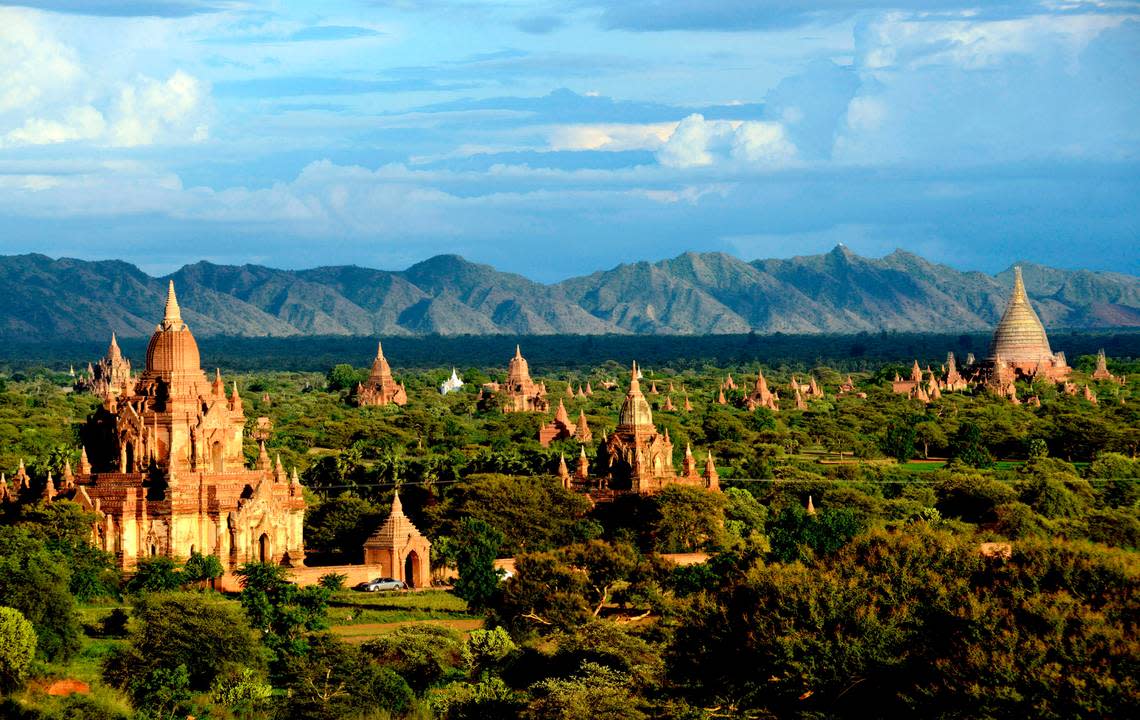
Every step of the timber operation from logging to auctioning to traders is controlled by MTE, now under U.S. sanctions for the “production and export of timber on behalf of the Burmese military regime.” Colonel Khin Maung Yi, the natural resources minister, under whose purview MTE falls, is also sanctioned.
The Herald has seen records of traders using U.S. currency to buy teak from MTE in auctions — Myanmar allows export timber to be purchased only in U.S. dollars — dated as recently as October 2022. Much of the current fighting is taking place in the jungles and it is unclear how the civil war has affected logging operations and whether the teak MTE is auctioning now has been freshly harvested or comes from pre-coup stockpiles. (While the Herald only saw records of some and not all of MTE’s post-coup auctions, none of those showed the names of Florida Teak or any of its direct suppliers.)
Whenever the teak was harvested before or after the coup, MTE’s de facto monopoly over the sector means that proceeds of any timber auction held since the coup goes to the junta, said multiple sources in Myanmar as well as Francesca Marzatico of the University of Otago, New Zealand. Marzatico was an advisor to the pre-coup Myanmar government.
If a U.S. business purchased or received teak after MTE was sanctioned, regardless of when the tree was cut down and harvested, that would trigger a violation, said Piatetsky, the ex-Treasury sanctions expert.
Even prior to the coup, the system was set up such that all proceeds from sales by state-enterprises like MTE were deposited into the Myanmar Foreign Trade Bank’s roughly 50 accounts in corresponding banks across the world. The money never physically entered Myanmar. This same method is being used to circumvent current sanctions, said sources in Myanmar who spoke to the Herald on condition of anonymity for fear of retaliation from the junta.
With friends like these
Not much is known about Florida Teak, officially called Global Dynamics Capital, LLC, besides the products it advertises on its website — teak planks for flooring, furniture and boat decks. Corporation records show the firm was established in 2009 and its proprietors are Peter and Claudia Kajanoja, an accountant.
The company announced in February last year that “Burmese teak will not be available in the near future” due to the sanctions and said that supplies are limited to current stocks.
But the Herald’s analysis of import records found that the firm imported more teak directly shipped from Myanmar in 2022 than in the two preceding years.
Overall, a third — 550,000 pounds — of the total teak the company imported in the past three years can be traced to Myanmar and entered the United States after the sanctions were imposed, according to the Herald’s analysis of records associated with the consignments’ bills of lading.
Nearly 85% of the Burmese teak that Florida Teak imported post-sanctions were purchased from Myanmar firm Pa Pa Wadi Company and Singapore-based Trans Continents (Pte.). The two appear to be linked. Pa Pa Wadi’s owner, according to his LinkedIn account, also owns another Myanmar wholesaler, which in turn shares a director with Trans Continents.
Some of Florida Teak’s suppliers for shipments prior to the sanctions allegedly have questionable practices.
Among them is Taiwan Traine Timber Corp, a Taiwanese firm that confirmed to the Herald and its reporting partners that it had supplied Burmese teak to the West Palm Beach firm in the past two years worth $700,000. A director of the company allegedly indicated in 2017 that he had bribed Myanmar officials, a confidential report seen by the Herald indicated. The report was shown to the Herald on condition of anonymity and according to the source, has since been shared with U.S. government officials. The company denied the allegation.
Another teak supplier is Friends Timber in India. It said it had shipped MTE-sourced Burmese teak to Florida Teak but asserted that the wood had been purchased before the sanctions.
The Kajanojas did not respond to the Herald’s questions about these companies or their teak imports and did not provide any documentation regarding what due diligence they perform.
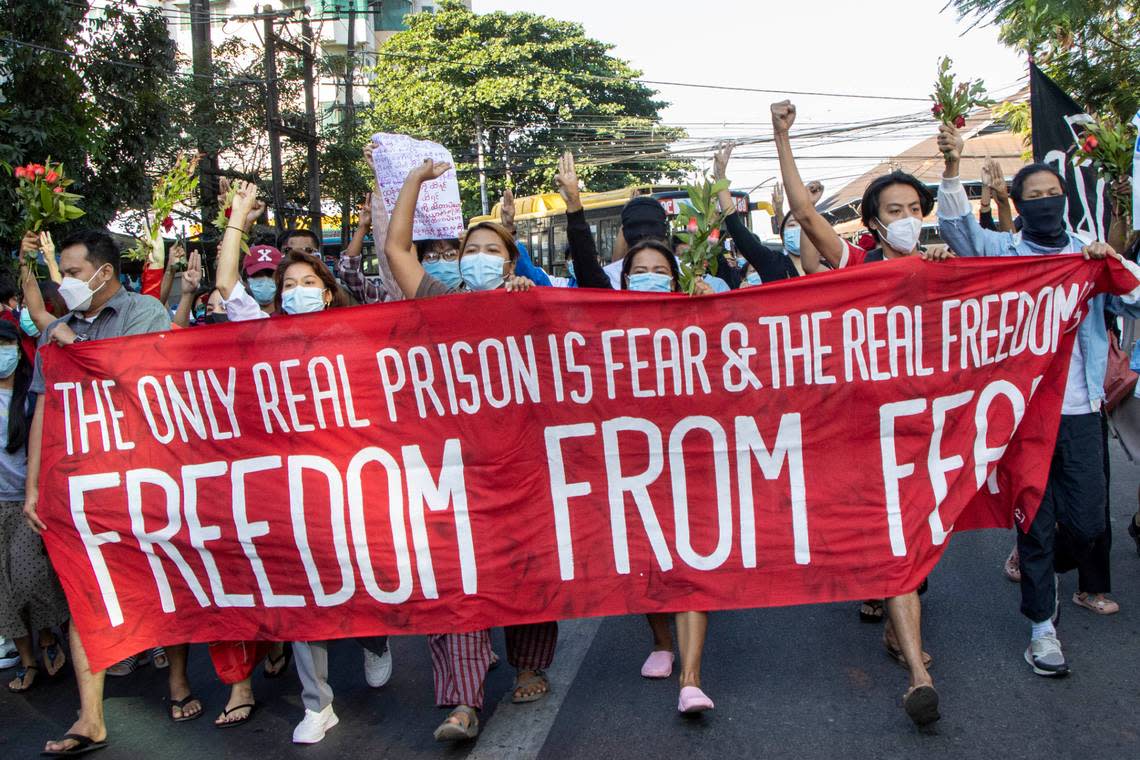
Several teak traders told the Herald and its reporting partners the same thing — that their business was above-board because they had placed the order for the wood before the sanctions and are only receiving it now due to COVID-related delays.
But the Herald’s figures on teak imports reflect only consignments that were loaded and shipped from Myanmar after the sanctions were imposed. Ex-Treasury sanctions experts the Herald consulted said traders might be risking prosecution even if the formal purchase date was prior to the sanctions and they are only getting the goods delivered now.
Michael Malloy and Peter Piatetsky, the two former Treasury sanctions experts, both said that the purchase date does not matter since the current sanctions clearly state they apply “notwithstanding any contract entered into … before the date” of imposition.
“Teak traders who have continued business with MTE after the coup attempt are supporting a murderous military junta,” said Yadanar Maung of Justice for Myanmar, a coalition of Burmese civilian activists.
“No yacht or deck-chair can justify the fatal cost of this trade to the lives of the people of Myanmar and the destruction of Myanmar’s forests.”
The Indian Express’ Ritu Sarin contributed from Delhi and Nagpur, India as did Kwangyin Liu of CommonWealth Magazine from Taipei City, Taiwan. Frederik Obermaier of Munich-based investigative outlet, Paper Trail Media, and Scilla Alecci of the International Consortium of Investigative Journalists also contributed.
